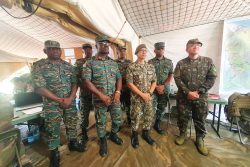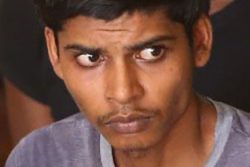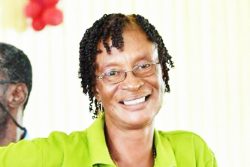The most dramatic event to take place in our extended neck of the woods this week will not be happening here, but in the capital to our west. On Friday the current President of Venezuela Nicolás Maduro is due to be sworn into office for another six-year term, despite the fact the evidence shows he lost the July 28 election by a wide margin to Mr Edmundo González.
The rightful winner subsequently was granted asylum in Spain, but he has now embarked on a Latin American tour, beginning with Argentina yesterday. This is a prelude, he says, to returning to Venezuela on January 10th to be sworn in as the lawful head of state. He has provided no details about how he will enter the country, never mind how he will accomplish his swearing-in, given that on Thursday the government announced a reward of US$100,000 for his capture.
According to the police agency responsible for criminal investigations Mr González has been charged with a number of crimes, including conspiracy, complicity in violent acts, forging documents, money laundering, disregarding state institutions, instigation to disobey laws and association to commit crimes.
If the would-be President does succeed in openly returning to his homeland, therefore, he can expect immediate arrest.
So what is his plan, other than to become a martyr? It seems that the power behind the opposition, Ms María Machado, wants the populace to come out on the streets on Friday, although she has not as yet been quite specific in terms of the date. “We have to think about what would happen if we all acted in coordination, at the same time. This is the key. An immense majority does not allow themselves to be crushed by a few, if each one does his part. Because freedom depends on everyone,” she is reported as saying on social media. All Venezuela will be on the streets “in a cry for freedom,” she said.
She ended with the assurance, “I will be with you and you have to be there. Just as no one could vote for you, no one can replace you that day … The time has come.” Earlier last week she also had words for the security forces, appealing to them on social media to tear down “the last obstacle” to securing freedom in the country. Their duty and honour, she said, should be directed towards defending the “popular and sovereign mandate expressed in the voting booth.”
It is not as if Mr Maduro will be waiting around fatalistically to be removed by a mass of opposition supporters on Friday. He has prepared carefully for the occasion of his swearing-in. The Government of Venezuela will never again fall into the hands of “a puppet of the oligarchy and imperialism,” he said three days ago, going on to tell Venezuelans, “On January 10, 2025, we will take to the streets by the millions to swear by Venezuela, to swear by independence.”
It is not just thousands of his supporters who will be out on the streets, but a gamut of the armed services of one kind or another. Like many autocracies the Venezuelan government does not rely on a single security force such as the army to maintain itself in power, although it will be there too. There will also be the police and various police agencies as well as armed militias and possibly the National Guard as well. Even if, for the sake of argument, the army and police were to heed Ms Machado’s call, she cannot depend on all groups under arms to follow suit.
According to the daily Tal Cual in addition to popular mobilization the ruling party has been training special security commandos for the day. Ms Machado has commented that the only thing left to the regime is to instil fear. “The moment we break this, they are left with nothing. It’s over,” she said.
While that is true, the occasions when members of a crowd will abandon their instincts for self-preservation and subsume their identities under that of the group so they can face down the bullets, do not occur very often. It is the kind of thing soldiers are trained to do on a battlefield, but civilians generally do not do unless there are very special circumstances or they become a mob in a context of chaos.
As it is the public is only too aware of what happened following the post-election protests when so many were arrested, including even young teenagers. Some of those who were recently released have emerged with stories of torture, and while quite a number have now been set free, some commentators have called it a ‘revolving door’ since at the same time other people have been taken into custody. Those who go on the streets for the opposition, consequently, will recognize they have reason to be afraid.
As things stand no one is too sure what is going to happen. First of all, if Mr González does not return the opposition will lose all credibility. If he tries to enter on some public flight, then either the plane will not be allowed to land, or if it does, he will be arrested. One must presume, therefore, the intention is to smuggle him into the country, and after that, to smuggle him into Caracas, or at least to try and bring him into the city with thousands of supporters surrounding him.
Then there is the question of supporters. Mr Maduro has the resources to ensure the attendance of thousands of followers from anywhere in the country, if need be, and some of these have been mobilized already. While one must presume that Ms Machado has embarked on some level of clandestine organization of opposition citizens in order to bring out the numbers she would require, it would still necessitate possibly thousands of potential protestors taking an individual decision on their own to go out. The question has to be asked how many would be prepared to take the risk?
Even if she did manage to get a large number of Venezuelans on the streets, it is unlikely that central Caracas, even if they were allowed to get anywhere near it, would be like Tahrir Square during the Arab Spring when the Egyptian army refused to fire on demonstrators. If the army didn’t, then other armed bodies might well do so. At the very least, there might well be clashes between the two sets of supporters. If Mr González appeared and Ms Machado succeeded in mobilizing enough people, then the odds of some level of violence might be high.
There is always the possibility that the opposition action would go off like a damp squid. That would depend on Mr González, on their numbers on the street and whether they stood their ground in the face of armed resistance. It might even be that their plans wouldn’t materialize at all if certain key elements were not in place.
However it plays out, this inauguration, far more than its predecessors. would have consequences for the region, in particular, Colombia, Brazil, Trinidad and, of course, Guyana.









